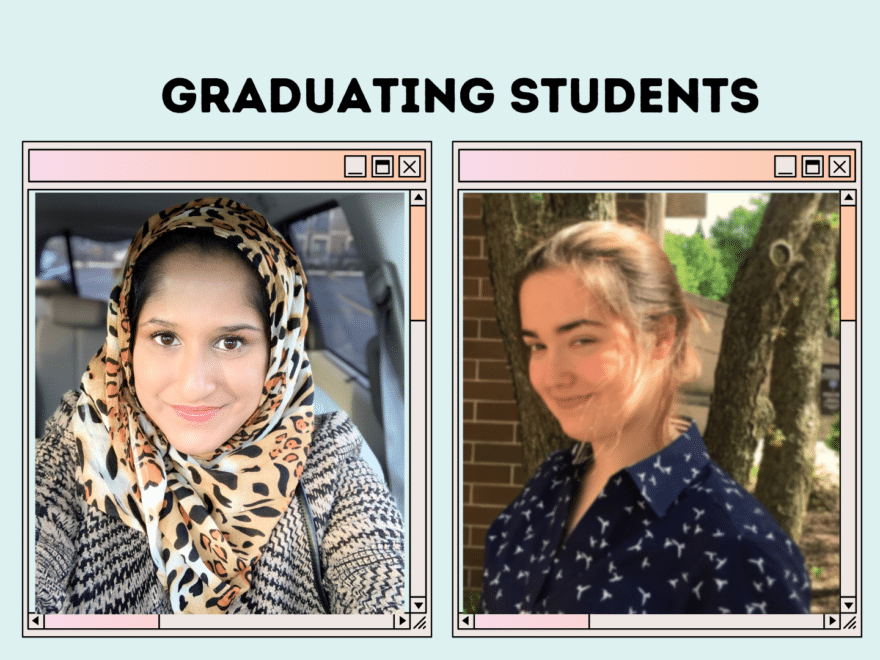As another quarter comes to an end WRD will graduate two students off onto their next steps in professional life . We caught up with Faiza Ikram and Kate Fasbik to hear what they had to say about their time with WRD, what it taught them, and what you too can take away from the program into your job search (or “professional efforts”?).
1. What are your plans for after WRD? Job hunt? Any successful searches?
FI: I haven’t started job hunting just yet. I technically don’t graduate until mid-December because of a teaching internship I’m doing at Harold Washington which is on a semester-based system. After graduation, I hope to work at the two and/or four-year college level as an English/composition instructor.
KF: I’m lucky enough that I already have a full-time job lined up for the week after finals (the 29th!), I’ll be working at Motorola Solutions as a technical writer. This all came after months of searching, rounds of interviews at different places, tweaking my final portfolio, as well as my application materials (my resume, cover letters, etc),
2. What was your favorite part of WRD, be it a class or a project?
FI: Some of my favorite classes include WRD 543: Teaching ESL Writing, WRD 540: Teaching Writing, and WRD 506: Multicultural Rhetorics. Participating in the Teaching Apprenticeship Program (TAP) provided me with first-hand experience in teaching composition at the four-year college level while being supported and guided by the director of the first-year writing program at DePaul and my fellow cohort members.
KF: My favorite part was the larger projects that I could work on more so than simple papers or things like that; I liked learning about different topics and getting the chance to do less conventual projects that allowed me to embrace multimodal composing.
3. What was the most impactful or important thing you learned?
FI: The importance of celebrating students, their writing, and their voice. A little respect and acknowledgment goes a long way.
KF: Since I’m going into a job in technical writing, I would say that the technical writing courses (both undergrad and grad) that I completed helped me build my confidence as a writer. Saying all of this, the most meaningful thing I learned in this department was to write, revise, and write some more, all while being mindful of who you’re writing for. The main thing I led interviews with was that I was open to iterative processes, writing accessible content, and generally thinking about audience in all circumstances. This came from all my courses (you can see content strategy and all other courses here) but has impacted every time I compose a new project.
4. What was the most meaningful critique/criticism you received?
KF: Definitely on my website / final portfolio (https://www.katefabsik.com/)! It’s not perfect, but the feedback I received on that helped me refine how I thought of myself as a professional – I’m not perpetually a student or have to be labeled as being post-student. Instead, I’m soon to be a professional and shaping the content on my portfolio really helped me internalize that.
5. Did WRD help you fulfill your goals, or change them?
FI: WRD helped me fulfill my goals of preparing to work as a writing instructor in a post-secondary institution. When applying to graduate schools, I only applied to DePaul’s WRD program because from my research, I felt that they were the only program in Illinois to offer a combination of courses in writing and language pedagogy with real-world opportunities to practice what you learn in the classroom.
KF: I would say so! It helped me figure out what I’m competent at as well as confident and interested in. Coming into the program, I genuinely had little idea of what I wanted to do or what sort of professional job I wanted, other than I wanted something stable. After taking several courses at the department and using the skills to take on part time jobs and working at the writing center, I realized that the technical writing work, discussions, and responsibilities sounded more and more like what I’d be suited to doing. Thus, after taking courses here, consulting with faculty, I found that I was more and more confident in my job search.
6. Do you have any tips for current students finishing out?
FI: Don’t be afraid to use your professors, advisors, and the program to your benefit. Ask for opportunities, ask questions, and ask for help. If you’re uncertain about what you want to do career-wise, register for different types of courses and seek different experiences. The faculty are willing to bend over backwards (within reason!) to help you achieve your goals!
KF: Talk to faculty for any resources you’re looking for! I talked to several about the field of technical writing, interview basics for the field, and how I could work on my final portfolio.
Thank you and good luck to our graduating students, you and your contributions to our department will be greatly missed!
